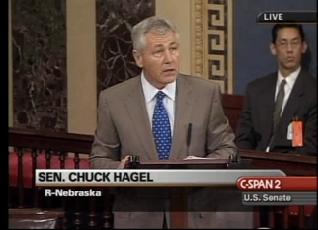When Chuck Hagel, President Barack Obama’s nominee for Secretary of Defense, appears before the Senate, one critical question must be asked: does he still believe that the Israeli-Palestinian conflict is the “core” of all conflict in the Middle East?
That claim, which Hagel made on the Senate floor in July 2006, is not only fundamentally wrong, but is also the key to Hagel’s views on Israel and the so-called “Jewish lobby.”
Hagel’s 2006 address, in which he called for an immediate cease-fire in the Second Lebanon War, has received renewed attention recently–particularly his call for a balanced approach to U.S. foreign relations: “Our relationship with Israel is a special and historic one. But, it need not and cannot be at the expense of our Arab and Muslim relationships. That is an irresponsible and dangerous false choice,” Hegel said.
Hagel’s comments on the Israeli-Palestinian conflict are even more revealing:
The core of all challenges in the Middle East remains the underlying Arab-Israeli conflict. The failure to address this root cause will allow Hezbollah, Hamas and other terrorists to continue to sustain popular Muslim and Arab support a dynamic that continues to undermine America’s standing in the region, and the governments of Egypt, Jordan, Saudi Arabia, and others whose support is critical for any Middle East resolution.
What Hagel seemed not to understand, or refused to admit, was that terrorist groups such as Hezbollah and Hamas are themselves the cause of the Israeli-Palestinian conflict.
He reiterated his views a week later, on CBS News’ Face the Nation, saying that “the central issue in the Middle East between Arabs, Muslims and Israelis, is the Israeli/Palestinian issue.”
Not radical Islam; not repressive Arab regimes; not Al Qaeda terror; not Iran’s pursuit of nuclear weapons; but the Israeli-Palestinian conflict.
The past six years have proven just how wrong Hagel was. Since then, the Iraq “surge” worked; the people of Iran rose up against the mullahs; the Arab Spring swept away one tyrant after another; the Libya war swept Gaddafi from power; the Sudan divided; the Syrian regime began to crumble; and Al Qaeda began a new war in Mali.
None of those dramatic changes and conflicts have anything to do with the Israeli-Palestinian conflict.
The only people who cling to the idea that the Israeli-Palestinian conflict is “central” are those who want to pressure Israel to make concessions to a Palestinian Authority that shows little interest in peace.
At this point in history, given all that Israel has conceded, and the terror it has received in return, there is no basis for the view that Israel is “the core” of conflict in the Middle East–except perhaps animus towards Israel itself.
Regardless, Hagel’s view is on the margins of mainstream American thought. At the time he made his remarks, Hagel’s words were celebrated by the likes of John Mearsheimer, co-author of the anti-Israel screed The Israel Lobby, who praised Hagel in an Aug. 28, 2006 forum of the radical Council on American-Islamic Relations, adding: “One can be sure that [Hagel] stands zero chance of becoming the next president of the United States.”
Hagel was also praised by Ghassan Rubeiz of the Arab-American News:
Senator Hagel challenged U.S. Israeli policy with the exceptional vision of a seer and the courage of a prophet. Normally, the first law of Middle East politics in Washington is that ‘Israel is right, no matter what.’ Any Congress member who challenges Israel or criticizes the U.S.’ symbiotic alliance with Israel must be either politically suicidal, a retired politician or an extremely brave and active legislator. Hagel, a presidential 2008 candidate, falls in the category of the brave and credible. (Aug. 5, 2006)
Those most hostile to a strong U.S.-Israel relationship were also the most encouraged by Hagel’s remarks–just as they are Hagel’s strongest defenders today.
At the time, there were Democrats who criticized Hagel’s remarks about Israel–including his Democratic colleague from Nebraska, Sen. Ben Nelson, who rejected Hagel’s call for an immediate cease-fire, noting that Israel had not yet received any security guarantees.
Will the Senate–and Democrats in particular–find the courage today to question Hagel’s views?
They must–for if Hagel believes terror victims, not terror groups, are the cause of conflict, he is not only wrong about Israel, but also unfit to lead America’s defenses.

COMMENTS
Please let us know if you're having issues with commenting.